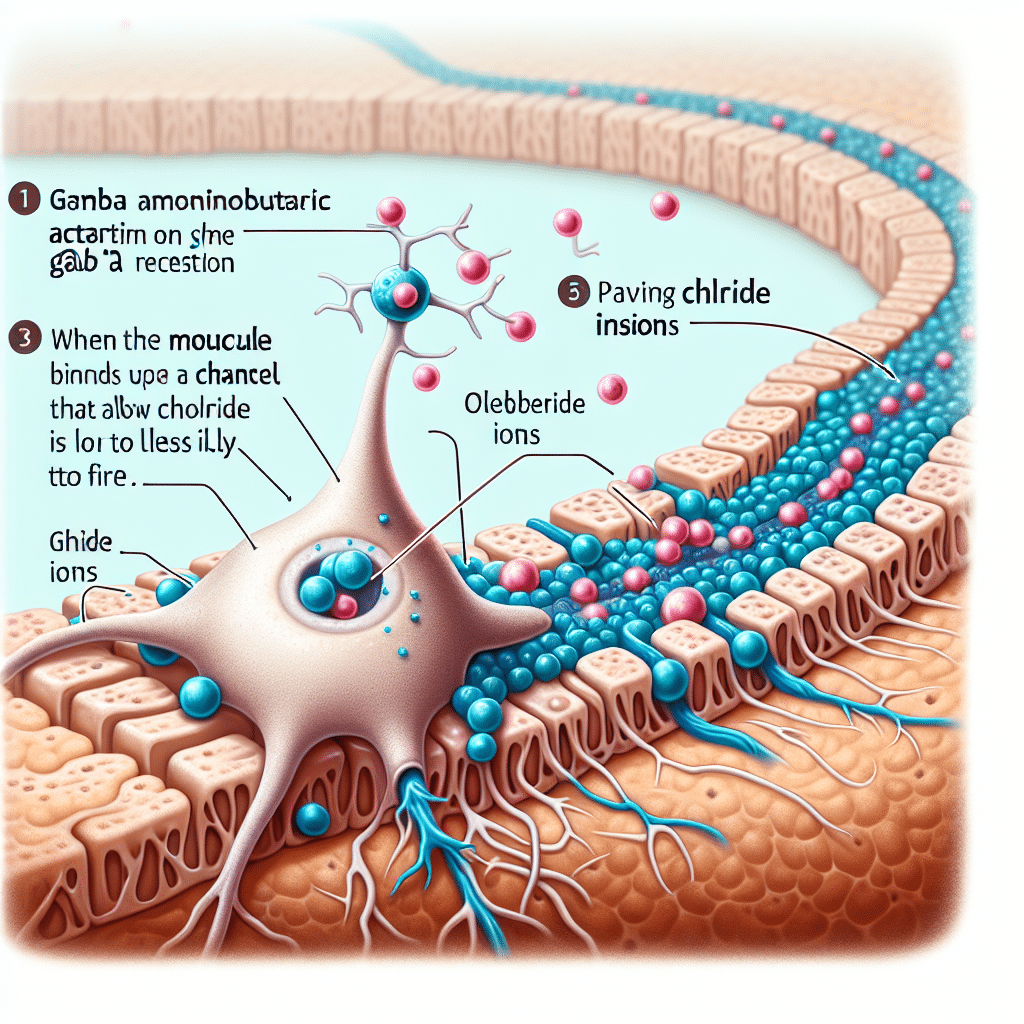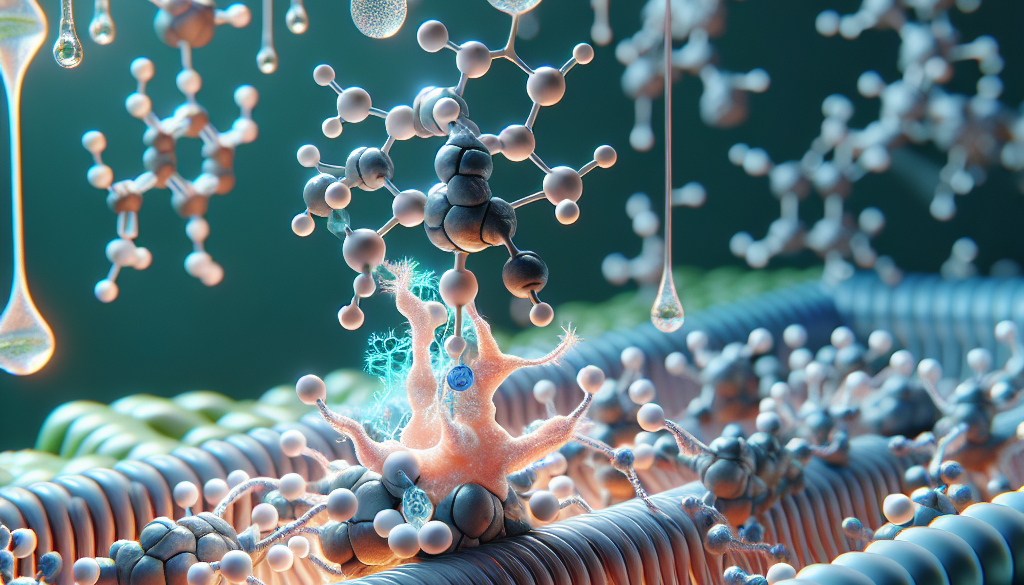Gamma Aminobutyric Acid Receptor Function
-
Table of Contents
- Gamma Aminobutyric Acid Receptor Function: A Deep Dive
- Understanding GABA Receptors
- Role of GABA Receptors in the Nervous System
- Examples and Case Studies
- Implications of GABA Receptor Dysfunction
- Statistics and Research Findings
- Conclusion
- Gamma Aminobutyric Acid Receptor Function: Key Takeaways
- Enhance Your Health with ETprotein’s Premium Protein Products
Gamma Aminobutyric Acid Receptor Function: A Deep Dive

GABA (Gamma Aminobutyric Acid) receptors are pivotal in the regulation of neuronal excitability throughout the nervous system. As the primary inhibitory neurotransmitter in the brain, GABA plays a crucial role in maintaining the delicate balance between neuronal excitation and inhibition. This balance is essential for normal brain function, and disruptions can lead to various neurological disorders. In this article, we will explore the function of GABA receptors, their importance in the nervous system, and the implications of their dysfunction.
Understanding GABA Receptors
GABA receptors are protein complexes located in the membranes of neurons. They are classified into two main types: GABAA and GABAB receptors. Each type has a distinct structure, distribution, and mechanism of action, contributing to the overall inhibitory effect of GABA within the nervous system.
GABAA Receptors
GABAA receptors are ligand-gated ion channels, also known as ionotropic receptors. When GABA binds to these receptors, they undergo a conformational change that opens a chloride ion channel. The influx of chloride ions hyperpolarizes the neuron, making it less likely to fire an action potential. This process is rapid and results in fast synaptic inhibition.
GABAB Receptors
On the other hand, GABAB receptors are G-protein-coupled receptors, also known as metabotropic receptors. These receptors do not contain an ion channel but instead activate second messengers when GABA binds to them. The activation of GABAB receptors leads to slower, prolonged inhibitory effects compared to GABAA receptors.
Role of GABA Receptors in the Nervous System
GABA receptors are widely distributed throughout the central nervous system and play a key role in various physiological processes. Here are some of their primary functions:
- Regulation of Muscle Tone: GABAA receptors in the spinal cord help control muscle contraction and relaxation, thus regulating muscle tone.
- Modulation of Sleep: GABAergic activity is associated with the induction and maintenance of sleep, particularly through GABAA receptors.
- Anxiety Reduction: GABAA receptors in the limbic system are involved in the modulation of anxiety and stress responses.
- Seizure Control: By inhibiting excessive neuronal firing, GABA receptors play a crucial role in preventing seizures.
- Cognitive Functions: GABAB receptors are implicated in memory and learning processes.
Examples and Case Studies
Research has provided numerous insights into the function of GABA receptors. For instance, studies on benzodiazepines, a class of drugs used to treat anxiety, have shown that they enhance the effect of GABA at GABAA receptors, leading to an increased inhibitory effect. Similarly, the mechanism of action of various antiepileptic drugs involves the modulation of GABAergic transmission.
Case studies of individuals with mutations in genes encoding GABA receptors have further illustrated their importance. For example, mutations in the GABRG2 gene, which encodes a subunit of the GABAA receptor, have been linked to familial epilepsy, highlighting the receptor’s role in seizure control.
Implications of GABA Receptor Dysfunction
Dysfunction of GABA receptors can lead to a range of neurological and psychiatric disorders. Here are some conditions associated with GABAergic dysfunction:
- Epilepsy: Reduced GABAergic inhibition can lead to the hyperexcitability of neurons, resulting in seizures.
- Anxiety Disorders: An imbalance in GABAergic activity is thought to contribute to the pathophysiology of anxiety disorders.
- Schizophrenia: Abnormalities in GABAergic neurotransmission have been observed in patients with schizophrenia.
- Huntington’s Disease: This neurodegenerative disorder is associated with the loss of GABAergic neurons in the basal ganglia.
Statistics and Research Findings
Statistical analysis and research findings have provided valuable insights into the function of GABA receptors. For instance, studies have shown that approximately 20-30% of all synapses in the human brain are GABAergic. Furthermore, research has indicated that GABAA receptors are involved in approximately 40% of all inhibitory synaptic processes in the brain.
Recent advancements in neuroimaging techniques have allowed scientists to study GABA receptors in vivo. For example, positron emission tomography (PET) studies have demonstrated altered GABA receptor distribution in various neurological disorders, providing a potential biomarker for these conditions.
Conclusion
In summary, GABA receptors are essential components of the nervous system that facilitate inhibitory neurotransmission and maintain neuronal stability. Their dysfunction is implicated in a variety of neurological and psychiatric disorders, making them a significant focus of research and therapeutic intervention. Understanding the intricate workings of GABA receptors continues to be a critical area of study with the potential to unlock new treatments for many debilitating conditions.
Gamma Aminobutyric Acid Receptor Function: Key Takeaways
- GABA receptors are essential for inhibitory neurotransmission in the brain.
- There are two main types of GABA receptors: GABAA (ionotropic) and GABAB (metabotropic).
- GABA receptors play a role in regulating muscle tone, sleep, anxiety, seizure control, and cognitive functions.
- Dysfunction of GABA receptors is associated with various neurological and psychiatric disorders.
- Research and case studies highlight the importance of GABA receptors in maintaining normal brain function.
Enhance Your Health with ETprotein’s Premium Protein Products
If you’re looking to support your health and well-being, consider incorporating high-quality protein products from ETprotein into your diet. ETprotein offers a wide range of organic bulk vegan proteins that are non-GMO and allergen-free, ensuring you receive the best nutrition for your body’s needs. Their products, including Organic rice protein, pea protein, and various seed proteins, are perfect for anyone seeking to enhance their dietary protein intake. Additionally, ETprotein’s L-(+)-Ergothioneine (EGT) products offer antioxidant properties that can further support your health. To learn more about their offerings and how they can benefit you, contact ETprotein today.
About ETprotein:
ETprotein, a reputable protein and L-(+)-Ergothioneine (EGT) Chinese factory manufacturer and supplier, is renowned for producing, stocking, exporting, and delivering the highest quality organic bulk vegan proteins and L-(+)-Ergothioneine. They include Organic rice protein, clear rice protein, pea protein, clear pea protein, watermelon seed protein, pumpkin seed protein, sunflower seed protein, mung bean protein, peanut protein, and L-(+)-Ergothioneine EGT Pharmaceutical grade, L-(+)-Ergothioneine EGT food grade, L-(+)-Ergothioneine EGT cosmetic grade, L-(+)-Ergothioneine EGT reference grade and L-(+)-Ergothioneine EGT standard. Their offerings, characterized by a neutral taste, non-GMO, allergen-free attributes, with L-(+)-Ergothioneine purity over 98%, 99%, cater to a diverse range of industries. They serve nutraceutical, pharmaceutical, cosmeceutical, veterinary, as well as food and beverage finished product distributors, traders, and manufacturers across Europe, USA, Canada, Australia, Thailand, Japan, Korea, Brazil, and Chile, among others.
ETprotein specialization includes exporting and delivering tailor-made protein powder and finished nutritional supplements. Their extensive product range covers sectors like Food and Beverage, Sports Nutrition, Weight Management, Dietary Supplements, Health and Wellness Products, and Infant Formula, ensuring comprehensive solutions to meet all your protein needs.
As a trusted company by leading global food and beverage brands and Fortune 500 companies, ETprotein reinforces China’s reputation in the global arena. For more information or to sample their products, please contact them and email sales(at)ETprotein.com today.














